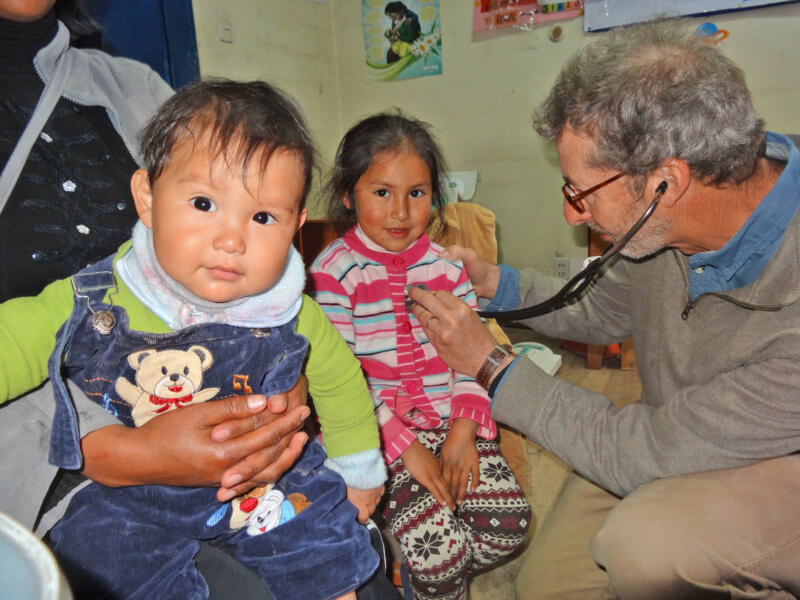Barry Finette: Saving lives across the globe
Most people run away from disasters, but Dr. Barry Finette runs toward them.
The University of Vermont professor and pediatrician has run to a variety of humanitarian projects and disaster relief missions in Bangladesh, Benin, Bhutan, Burkina Faso, Cameroon, Congo, Ecuador, Ethiopia, Jamaica, Peru, Philippines, South Africa, Togo and Uganda. He’s also the founder of a clinical intelligence platform called THINKMD which is designed to help those nations help themselves and lessen their reliance on healthcare specialists from other countries.

Finette has a very simple explanation for what he does. “It’s important for me to leave things better than where I found them,” he said. “When people go through a disaster or challenging times, I enjoy working with them and seeing what I can do to help make their situation better.”
Finette said he grew up with two parents who cared for him and provided food and shelter, but in other parts of the world, children might have the same kind of loving parents, but they don’t have access to the same opportunities because they live where there is political and economic insecurity. He noted that in many low-income countries, there is only one physician for every 2,000 to 50,000 people.
In 1989, Finette began teaching pediatrics, microbiology and molecular genetics at the University of Vermont while also practicing pediatrics and taking part in humanitarian relief efforts with Project Hope.
“After 25 or 30 years, I was looking to explore other things,” he said. “I was particularly interested in global health and humanitarian aid.”
Finette took a sabbatical in the hope of finding new ways to contribute. Upon his return he founded the Global Health and Humanitarian Opportunity Program at University of Vermont.
“In Vermont and in particular at UVM there are a lot of incredible, highly-qualified global health specialists,” he said. “I wanted a forum for us to work together.”
Realizing that there was the potential to do more, Finette founded THINKMD in 2014.
“There is a global shortage of physicians and highly trained nurses across the globe,” he said. “That’s not going to change. I thought we could build technology that could transfer position-based skill sets into a simple digital format which could be used by those without those skills.”
Finette’s background is in science and medicine, not entrepreneurship, but he is happy with the success of THINKMD.
“We’ve survived long enough that we’re no longer considered a start-up,” he said. “That’s a very difficult thing to do but I love doing challenging things.”
THINKMD is used by a variety of humanitarian organizations in 11 countries in Africa, South Asia and Southeast Asia. “It’s designed for low-income countries,” Finette said, “but it can be used anywhere.”
Finette has travelled extensively and appreciates each of the countries he has had the opportunity to visit, but the trips that stand out most in his mind are the ones he has been able to take with family members. His son Ezra has worked with him in the field and both Ezra and Finette’s wife Sharon joined him for validation studies for THINKMD in Zambia.
“Our technology allows non-professionals to do clinical evaluations,” he said. “You need to demonstrate that it does that and they were with me when we trained people and started implementing the program.”
Validation studies were conducted on over 1,000 children in four countries and the diagnoses by local practitioners correlated 80-95 percent with those made by remote physicians.
One of the reasons Finette chose pediatrics as his specialty is the variety of research opportunities with the young. Another is the complexity and the challenge of dealing with children.
“You’ve got everything from premature infants to adolescents,” he said. “Each has its own challenge, and you also need to understand the dynamics between your patients and their caregivers. That makes it incredibly challenging.”
Finette said many pediatricians gravitate to the larger children’s hospitals in Boston, Dallas and Philadelphia, but he is thrilled that he and his wife chose to work in Vermont. “There are things I was able to do here that I wouldn’t have been able to do elsewhere,” he said. “I did a cancer research project at UVM and was able to enroll every patient which might not have been possible at a larger hospital. The cooperation and collaboration with my colleagues is unique.”
Finette is taking some time off from disaster relief to build THINKMD which he hopes will make it easier for local people to respond to disasters within their borders, as he works to leave the world better than he found it.

